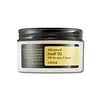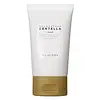What's inside
What's inside
 Key Ingredients
Key Ingredients

 Benefits
Benefits

 Concerns
Concerns

 Ingredients Side-by-side
Ingredients Side-by-side

Snail Secretion Filtrate
Skin ConditioningBetaine
HumectantCaprylic/Capric Triglyceride
MaskingButylene Glycol
HumectantCetearyl Olivate
Sorbitan Olivate
EmulsifyingCetearyl Alcohol
EmollientCarbomer
Emulsion StabilisingEthyl Hexanediol
SolventPhenoxyethanol
PreservativeArginine
MaskingDimethicone
EmollientSodium Polyacrylate
AbsorbentSodium Hyaluronate
HumectantAllantoin
Skin ConditioningPalmitic Acid
EmollientPanthenol
Skin ConditioningXanthan Gum
EmulsifyingStearic Acid
CleansingAdenosine
Skin ConditioningWater
Skin ConditioningMyristic Acid
CleansingSnail Secretion Filtrate, Betaine, Caprylic/Capric Triglyceride, Butylene Glycol, Cetearyl Olivate, Sorbitan Olivate, Cetearyl Alcohol, Carbomer, Ethyl Hexanediol, Phenoxyethanol, Arginine, Dimethicone, Sodium Polyacrylate, Sodium Hyaluronate, Allantoin, Palmitic Acid, Panthenol, Xanthan Gum, Stearic Acid, Adenosine, Water, Myristic Acid
Cetyl Ethylhexanoate
EmollientGlycerin
HumectantPentylene Glycol
Skin ConditioningHydrogenated Lecithin
EmulsifyingNiacinamide
SmoothingMacadamia Ternifolia Seed Oil
EmollientPEG-50 Shea Butter
EmulsifyingLimnanthes Alba Seed Oil
Skin ConditioningSqualane
EmollientCarbomer
Emulsion Stabilising1,2-Hexanediol
Skin ConditioningTromethamine
BufferingPanthenol
Skin ConditioningSodium Carbomer
Emulsion StabilisingErythritol
HumectantTrehalose
HumectantBetaine
HumectantButylene Glycol
HumectantCaprylhydroxamic Acid
Caprylic/Capric Triglyceride
MaskingAdenosine
Skin ConditioningLavandula Spica Flower Oil
MaskingXanthan Gum
EmulsifyingOzonized Olive Oil
Skin ConditioningHydroxyethylcellulose
Emulsion StabilisingOrange Roughy Oil
Skin ConditioningMadecassoside
AntioxidantBiosaccharide Gum-1
HumectantAsiaticoside
AntioxidantMalt Extract
Skin ProtectingAsiatic Acid
Skin ConditioningButter Extract
EmollientGlycyrrhiza Glabra Leaf Extract
Skin ConditioningCeramide AP
Skin ConditioningChamomilla Recutita Flower Extract
MaskingLinoleic Acid
CleansingEthylhexylglycerin
Skin ConditioningSodium Hyaluronate
HumectantLinolenic Acid
CleansingCetyl Ethylhexanoate, Glycerin, Pentylene Glycol, Hydrogenated Lecithin, Niacinamide, Macadamia Ternifolia Seed Oil, PEG-50 Shea Butter, Limnanthes Alba Seed Oil, Squalane, Carbomer, 1,2-Hexanediol, Tromethamine, Panthenol, Sodium Carbomer, Erythritol, Trehalose, Betaine, Butylene Glycol, Caprylhydroxamic Acid, Caprylic/Capric Triglyceride, Adenosine, Lavandula Spica Flower Oil, Xanthan Gum, Ozonized Olive Oil, Hydroxyethylcellulose, Orange Roughy Oil, Madecassoside, Biosaccharide Gum-1, Asiaticoside, Malt Extract, Asiatic Acid, Butter Extract, Glycyrrhiza Glabra Leaf Extract, Ceramide AP, Chamomilla Recutita Flower Extract, Linoleic Acid, Ethylhexylglycerin, Sodium Hyaluronate, Linolenic Acid
 Reviews
Reviews

Ingredients Explained
These ingredients are found in both products.
Ingredients higher up in an ingredient list are typically present in a larger amount.
Adenosine is in every living organism. It is one of four components in nucleic acids that helps store our DNA.
Adenosine has many benefits when used. These benefits include hydrating the skin, smoothing skin, and reducing wrinkles. Once applied, adenosine increases collagen production. It also helps with improving firmness and tissue repair.
Studies have found adenosine may also help with wound healing.
In skincare products, Adenosine is usually derived from yeast.
Learn more about AdenosineBetaine is a common humectant (a substance that promotes retention of moisture). It's known to be gentle on the skin and can help balance hydration.
This ingredient is best for improving hydration and soothing irritated skin. Studies also show it helps even out skin tone.
Fun fact: Betaine is naturally created in the skin and body. The kind found within cosmetic products can be either plant-derived or synthetic.
Another name for betaine is trimethylglycine.
Learn more about BetaineButylene Glycol (or BG) is used within cosmetic products for a few different reasons:
Overall, Butylene Glycol is a safe and well-rounded ingredient that works well with other ingredients.
Though this ingredient works well with most skin types, some people with sensitive skin may experience a reaction such as allergic rashes, closed comedones, or itchiness.
Learn more about Butylene GlycolThis ingredient is an emollient, solvent, and texture enhancer. It is considered a skin-softener by helping the skin prevent moisture loss.
It helps thicken a product's formula and makes it easier to spread by dissolving clumping compounds.
Caprylic Triglyceride is made by combining glycerin with coconut oil, forming a clear liquid.
While there is an assumption Caprylic Triglyceride can clog pores due to it being derived from coconut oil, there is no research supporting this.
Learn more about Caprylic/Capric TriglycerideCarbomer is a polymer of acrylic acid. Its main role is to create a gel consistency.
A high amount of carbomer can cause pilling or balling up of products. Don't worry, most products contain 1% or less of carbomer.
Panthenol is a common ingredient that helps hydrate and soothe the skin. It is found naturally in our skin and hair.
There are two forms of panthenol: D and L.
D-panthenol is also known as dexpanthenol. Most cosmetics use dexpanthenol or a mixture of D and L-panthenol.
Panthenol is famous due to its ability to go deeper into the skin's layers. Using this ingredient has numerous pros (and no cons):
Like hyaluronic acid, panthenol is a humectant. Humectants are able to bind and hold large amounts of water to keep skin hydrated.
This ingredient works well for wound healing. It works by increasing tissue in the wound and helps close open wounds.
Once oxidized, panthenol converts to pantothenic acid. Panthothenic acid is found in all living cells.
This ingredient is also referred to as pro-vitamin B5.
Learn more about PanthenolSodium Hyaluronate is hyaluronic acid's salt form. It is commonly derived from the sodium salt of hyaluronic acid.
Like hyaluronic acid, it is great at holding water and acts as a humectant. This makes it a great skin hydrating ingredient.
Sodium Hyaluronate is naturally occurring in our bodies and is mostly found in eye fluid and joints.
These are some other common types of Hyaluronic Acid:
Learn more about Sodium HyaluronateXanthan gum is used as a stabilizer and thickener within cosmetic products. It helps give products a sticky, thick feeling - preventing them from being too runny.
On the technical side of things, xanthan gum is a polysaccharide - a combination consisting of multiple sugar molecules bonded together.
Xanthan gum is a pretty common and great ingredient. It is a natural, non-toxic, non-irritating ingredient that is also commonly used in food products.
Learn more about Xanthan Gum